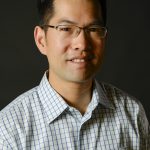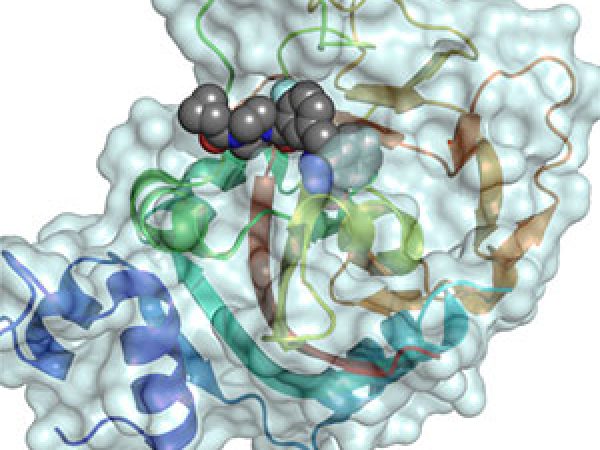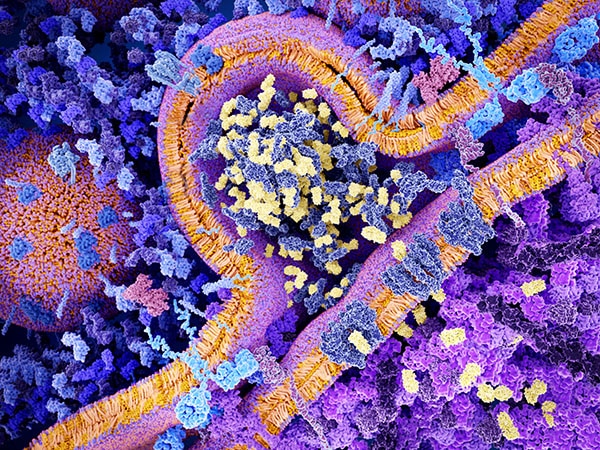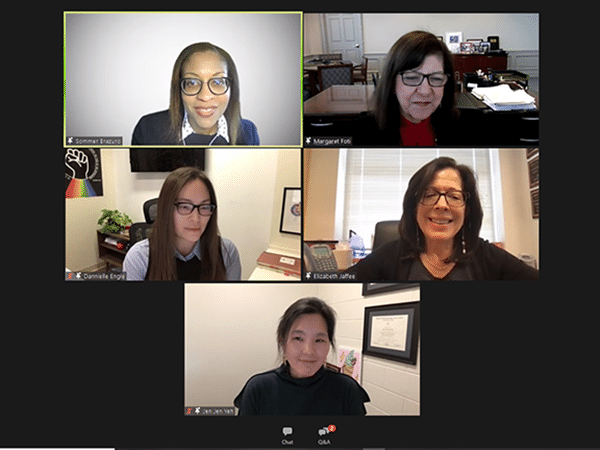NextGen Grantees Embark on Their Innovative Research
We first discussed AACR’s flagship funding opportunity for early-career investigators, the NextGen Grants for Transformative Cancer Research, on this blog last summer. As the name of these grants suggests, this funding mechanism is intended to support exciting, novel research that will dramatically impact our understanding of cancer.
An idea initiated by former AACR President, Carlos L. Arteaga, MD, the NextGen Grants Program truly lived up to its intention in 2016, with the selection of four highly innovative and paradigm-shifting projects.
The recipients of the inaugural NextGen Grants, funded through the AACR along with three partner organizations, represent some of the most versatile minds of the next generation of cancer researchers. They demonstrate an enthusiasm and passion for their fields that is contagious, and is sure to accelerate our current understanding of cancer, improve and enhance treatment options for patients, and delineate new paths of investigation that could lead to the next big breakthrough.
The projects proposed by these recipients encompass a wide range of tumor types, addressing key questions related to pediatric medulloblastoma (brain cancer), pancreatic cancer, prostate cancer, and breast cancer. Likewise, each project centers on a different approach to better understand, and potentially treat, these cancers including examination of tumor metabolism, genomics, identification of biomarkers, and evaluation of drug resistance.
Two of the inaugural NextGen recipients are focusing their work on devastating cancers that are often accompanied by a poor prognosis and limited survival.
Paul A. Northcott, PhD, assistant member at St. Jude Children’s Research Hospital in Memphis, Tennessee, and recipient of the AACR NextGen Grant, will address several important questions related to the molecular mechanisms that underlie medulloblastoma relapse in children. “These studies will inform upcoming clinical trials for a population of childhood cancer patients currently facing an unacceptably dismal prognosis,” Northcott says. “The NextGen grant will provide my lab with the essential funds needed to recruit highly motivated trainees to conduct this important work, as well as the resources to employ cutting-edge genomics to address a fundamental problem in cancer research.”
Meanwhile, Sophia Lunt, PhD, assistant professor at Michigan State University in East Lansing and recipient of the AACR-Incyte Corporation NextGen Grant, is using this critical funding to uncover metabolic transformations in pancreatic cancer, considered one of the most lethal tumor types. “Our work may lead to new combinatorial treatment strategies for a cancer bereft of effective treatments,” she says. “Furthermore, our approach can be applied to other cancers to reveal the metabolic secrets behind their uncontrolled growth, having a broader impact in improving outcomes for many types of cancer.”
The 2016 class of NextGen recipients also includes two physician-scientists who will tackle their respective projects with a unique, clinical perspective.
Andrew Hsieh, MD, assistant member at the Fred Hutchinson Cancer Research Center in Seattle and recipient of the AACR-Bayer NextGen Grant, is conducting important work that has great promise to unravel the very complex mechanisms that control tumor progression, with the ultimate goal of developing new prognostic biomarkers and therapeutics. “This grant has been instrumental in giving my lab the freedom to explore poorly understood areas of cancer biology,” says Hsieh. “In doing so, we intend to identify completely new therapeutic frontiers and powerful new biomarkers which can predict disease outcomes in patients.”
Likewise, Nikhil Wagle, MD, assistant professor of medicine at the Dana-Farber Cancer Institute in Boston and recipient of the AACR-Takeda Oncology NextGen Grant, is forging a new path in the field of breast cancer, investigating tumor resistance through genomic sequencing, in an effort to develop novel therapeutic strategies for patients. “As an early-career investigator, this research grant provides an exceptional opportunity for me to pursue research that otherwise may have been very challenging to support,” notes Wagle. “I look forward to working with the AACR on this exciting project in the hopes of making significant advances for patients with cancer.”
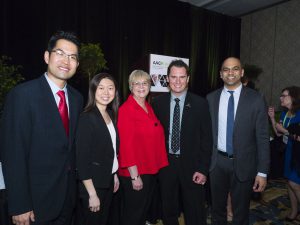
The 2016 NextGen grantees with Sara Courtneidge, PhD, associate director for translational sciences at Knight Cancer Institute at Oregon Health & Science University. Courtneidge was the emcee at the Grants Reception and Dinner at the AACR Annual Meeting in April 2016. Photo by Todd Buchanan.
These grantees began their research projects on July 1, embarking on groundbreaking work that exemplifies the spirit of this funding mechanism. We are eager to follow their progress over the course of their respective grant terms, and we are also pleased to offer this funding opportunity for the second year. Letters of Intent are currently being accepted for the 2017 AACR NextGen Grants for Transformative Cancer Research. The deadline for submission of a Letter of Intent is Sept. 12, 2016. For more information, please visit our Funding Opportunities page.



